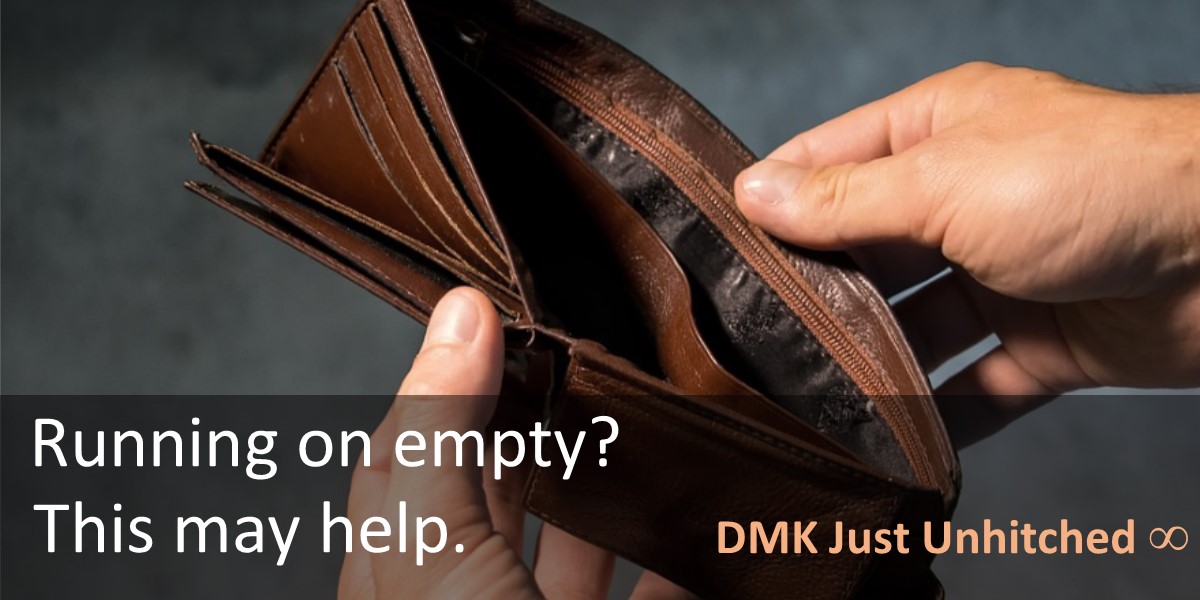After a divorce, financial setbacks are extremely common. They make it difficult to keep up with your expenses, maintain your current lifestyle and continue to save for the future. The mental exhaustion from money issues can cause problems for your job, family and health.
"Feelings" and finance
Often, our emotions get the better of us when divorcing. It makes it that much more difficult to immediately deal with our financial setbacks before they become gigantic problems. This is when something that could be fixed with some changes and sacrifice turns into something that seems like it can't be fixed before credit damage, further debt and bigger sacrifices. Some of us are forced into delinquency, foreclosure or bankruptcy.
It helps to recognize what emotional barriers prevent us from taking action. If we can't resolve them ourselves, counseling can help. If you are uninsured or your health insurance provider does not cover counseling, consider sliding scale providers who can provide a discount based on your income. Check out our DMK Directory or local clinics or universities for affordable counselors near you.
What gets in our way
Speaking for our people...those of us who have found our way into a divorce and debt, it usually includes a couple things most of us don't easily admit to ourselves as reasons our financial unhappiness.
After a divorce and while in debt, many of us are...
- ..in denial and depressed
- ..spoiled
It's not easy to admit either to ourselves, but at some point we have to take a good hard look into our situation and recognize why our finances aren't in good shape. Here's why:
Denial and depression after divorce are common for many of us. Here are some reasons why, along with a quick butt kicking rebuttal:
- We may not have the emotional strength to look at another facet (finances) of our "new life" following divorce despite knowing that we are either failing to improve or damaging our financial health.
If your emotional management during or following your divorce is in your way, seek counseling immediately. Your financial well-being is one of the most common associations to your overall well-being. Fixing one almost always improves the other. It's an easy place to start.
- We may know their is a problem but lack the discipline or know-how to easily resolve it, so we ignore it with plans to "work on it later".
Of course it isn't easy to solve what seems unsolvable. But there is a resolution to every problem. Whining, worrying or complaining allows the problem to control you. In order to take back control, you need to assume the confidence to solve it or have the clarity to find someone who can. This may include credit counselors, attorneys, accountants or financial advisors. After you understand all of the consequences to doing so (such as actions that may affect your credit, housing or job), consider settling some debts directly with your creditors. There are solutions and with every one, there are consequences, but the sooner you resolve each problem, the sooner you can direct your focus towards positive changes in your life. Your ability to solve problems will give you more confidence to create more possibilities to affect such positive change.
- The problem has already reached our limits of reasonable resolution and the alternatives are so bad (bankruptcy, foreclosure, etc.) we fail to take actions because we fear the consequences and social stigma. Nobody wants to go through "financial death". Like divorce which could be considered "relationship death", it can force us to label our endeavors a failure. But it only makes us a failure if we can't overcome our losses. Bankruptcy, foreclosure, short-sales, forbearances aren't really the end because they provide for resurrection.
You may lose a lot, you may assume a loss, but just like divorce, none inhibits you from starting over after a period of time. The longer you take to get started, the longer it will take to reach a point when you are prepared to rebuild. You may even find out that as bad as things seemed, you may not need to take such drastic actions as once thought. The only way to know is to take the first step to finding out. Call in the professionals: credit counselors, attorneys, accountants and financial advisors.
- We don't feel our financial problems should be our own and remain disgruntled and paralyzed to take action because our divorce settlement was unfair. We consider taking further legal action so we feel it would be a waste of time to deal with the debt for which we have been assigned.
Inaction is a problem, but the real issue is the denial that your settlement is final. If there was some wrongdoing that causes you to believe the settlement was unlawful, get an attorney and discuss your options. It solves both problems to your using your settlement as an excuse to improve your financial well-being and life. So, in other words, it's doing twice as much damage. But, you can only deflect the blame for half the damage if you continue to do nothing.
Spoiled behavior usually starts before our divorce, but many of us are guilty. Here's why:
- Most Americans have common spending problems that may be rooted in a sense of entitlement. We work hard, so we deserve to play hard. Furthering our assumption is through social media intoxication that puts the Jones' and all their doings in front of us, seven days a week, anytime of day.
Regardless our plans to spend at our means, inch-by-inch, day-by-day we slowly fall into the American credit trap, a trap where credit cards and home equity lines of credit can hide a multitude of sins - until they can't. If you were in debt before your divorce, studies have shown you have a higher likelihood of suffering worsened debt and lower credit score following. This may indicate that those who spent above their means before their divorce are likely to struggle financially after legal expenses, increased housing costs and/or decreased household income. It may be time to seek financial guidance if you simply can't comply with the budgetary modifications needed in order to improve your financial health. It starts with recognizing the Jones' aren't who "you should be trying to keep up with". Instead focus on taking steps to attain your financial freedom and security for actual personal fulfillment.
- The, "it's not fair", is common to nearly all of us, too. Perhaps we did get royally f*cked in our divorce, are victim of some terrible financial nightmare or have suffered an unplanned financial loss. Why should we pay for such financial wrongdoings that legally we are obligated to right, but technically don't result from our irresponsible low earning or high spending problem?
Again, the problem needs to be solved regardless if "the gods must be crazy!" Nearly all of us have assumed some awful problems that seem to just fall from the sky. The key is to acknowledge they hurt until you move them out of your way. It doesn't matter how many people agree with you or how clear it is that the problem shouldn't be yours to fix. Unless you have a legal or other professional telling you otherwise, you need to take responsibility. It's like being born with a big nose or ugly ears. It may not seem fair, but that's life and if you don't like it, take action to change it. That's right. Consider plastic surgery! If you don't like the face of your finances, cut that plastic in half. Investigate ways to reduce your debt in record speed or talk with a credit or financial advisor for guidance.
- I have always been in debt, who cares if I get in deeper. I'll never be debt-free anyway.
This is a classic excuse to do the wrong thing. The biggest problem with it is that eventually, you are forced to face the consequences because this type of behavior continues to escalate financial setbacks until they completely overtake you. One aspect of the problem is that you may suffer from low self-esteem. The longer you are in debt, the worse you will feel about yourself and your financial decision-making. Surround yourself with people and resources that will keep you forward-thinking to achieve your financial goals. Once you understand the credit or legal consequences, consider settling your large debts. The sooner you take control and reduce your debt, the better you'll feel about yourself. You'll be more inclined to protect your accomplishment, your improved financial picture; you won't be so easily swayed into assuming more debt.
Three options to get back on track
Unless you have a unique situation, when your expenses exceed your income you basically have three choices: cutback on your expenses, earn more money or both. Cutting back on your expenses can be helpful with the right guidance. Check out our 2020 Budget Series, DMK Money with tips, ideas and apps that can help you.
If you need to earn more we have a list of 10 top side gigs that are easy to get started and can make a big difference in your earnings!
10 top side gigs to increase your income
10. Care.com
Child care, housecleaning, pet sitting, senior care job matching service.
Help people around their home with things like: moving, installation of fans, tvs, mirrors or assembly of furniture
If you have good internet skills become a web tester of sites and apps
7. Upwork.com
Become a freelance writer, web designer, mobile developer, accountant or bookkeeper, sales person or marketer.
6. Etsy.com
Become an independent seller of clothes, household items and art.
5. Tutor.com
Teachers can make extra cash tutoring people on a variety of subjects.
4. Fiverr.com
Freelance in social media marketing, logo design, translation, voice over or illustration.
3. Ebay, Amazon or Craigslist
Buy and sell through the world's leading on-line retailers and classifieds.
Ride sharing provides flexible hours and higher than average part-time pay.
1. Grubhub
Deliver food from local participating restaurants in your area for great extra cash.



 How to resolve AdBlock issue?
How to resolve AdBlock issue?